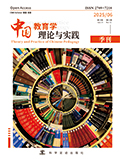

本文旨在论述惠州东江文化融入幼儿园园本课程可创造的文化与课程的价值,从而形成具有地方文化特色的园本课程,并分析其对幼儿发展和本土文化的存在价值,同时进一步探讨本土文化为核心的园本课程建设理论基础,通过精炼东江文化的文化内涵作为东江文化本土化园本课程建设的要素,包含客家文化、苏东坡寓惠文化、罗浮山中医药文化、体健养身武术文化及东江革命红色文化,本文提取生态理论以及园本课程理论与社会互动理论作为本文的理论框架,力求在合理的理论架构中发展东江文化园本课程的特色,并运用课程理论基础构件本土化园本课程的建设框架,作为课程设计的基础,并分析其在此理论基础上发展的东江文化本土化园本课程的真实而实际的价值,分析提出有创新东江文化传承早期扎根、教师专业能力的成长、幼儿主体经验的建构及发现东江文化的多元能动性等价值意义。
The article aims to discuss the cultural and curriculum value that can be created by integrating Huizhou Dongjiang culture into kindergarten curriculum,then form. a curriculum with local cultural characteristics, and analyze its value for the development of young children and the existence of local culture.At the same time it further explores the basic theory of the construction process of the kindergarten-based curriculum with the local culture as the core.By refining the cultural connotation of Dongjiang culture as an element of the localization of Dongjiang culture curriculum construction,includes Hakka culture,Su Dongpo' s Yvhui culture,Luofu Mountai Chinese medicine culture,physical health and martial arts culture, Donggjiang Revolutionary Red Culture.This article extracts ecological theory,kindergarten based curriculum theory,and social interaction theory as the theoretical framework,striving to develop the characteristics of the localized garden-based curriculum of Dongjiang Culture in a reasonable theoretical framework, and using the basic components of curriculum theory to localize the construction framework of kindergarten based curriculum as the basis for curriculum design.It analyzes the real and practical value of the Dongjiang culture localization kindergarten based curriculum developed on this theoretical foundation,and proposes innovative values such as early rooting of Dongjiang,innovative cultural inheritance,teachers’ professional growth,children’s main experience construction,and Dongjiang cultural diversity and initiative.